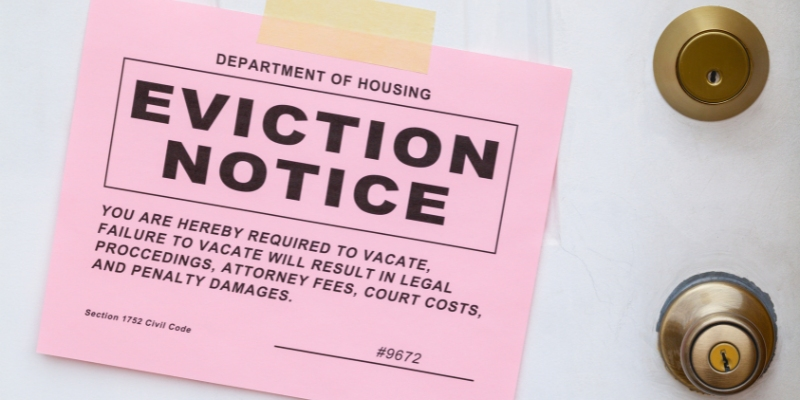
Understanding the Texas eviction laws is of utmost importance for both landlords and tenants alike. This comprehensive legal framework governs the process and grounds for eviction, ensuring fair and just treatment for all parties involved in rental agreements. In this article, we will delve into the intricacies of the Texas evictions, exploring the grounds, steps, and timelines involved, aiming to provide clarity and guidance to all stakeholders.
In Today’s Article:
- Texas Eviction Process Timeline
- Grounds for Eviction in Texas
- Illegal Evictions in Texas
- Filing an Eviction Lawsuit
- Serving Eviction Notices in Texas
- Accepting Partial Payment and Landlord Options
- Tenant’s Rights and Complaints
- Selling Property During the Eviction Process
Understanding Texas Evictions
In order to navigate the eviction process in Texas effectively, it is crucial to have a solid understanding of the state’s eviction laws. We will provide an overview of the eviction process, outlining the key steps and timelines involved.
Texas Eviction Process Timeline

The Texas eviction process follows a specific timeline that outlines the key steps and durations involved. It is important for both landlords and tenants to be familiar with this timeline to understand their rights and obligations throughout the process.
Serving a Written Notice to Vacate
The timeline typically begins with the serving of a written notice to vacate the premises. The notice period can vary depending on the reason for eviction. For nonpayment of rent, Texas law requires a minimum of three days’ notice, while other lease violations may require a longer notice period. During this time, tenants have the opportunity to rectify the issue or vacate the property voluntarily.
Filing an Eviction Lawsuit
If the tenant fails to comply with the notice, the landlord can proceed with filing an eviction lawsuit in Texas justice court. The filing initiates the legal process and typically requires the landlord to submit the necessary documents and pay the filing fees. Once the lawsuit is filed, the court will schedule a hearing date, usually within a few weeks.
Eviction Hearing
During the eviction hearing, both parties present their case, provide evidence, and argue their positions. The judge carefully considers the facts and applicable laws before making a judgment. If the judge rules in favor of the landlord, a judgment for possession will be issued, specifying a deadline for the tenant to vacate the premises, usually within a few days to a couple of weeks.
Writ Of Possession
If the tenant refuses to comply with the judgment and does not vacate the property voluntarily, the landlord can request a writ of possession from the court. Once the writ is issued, law enforcement officials will execute it by physically removing the tenant and their belongings from the rental property.
It’s important to note that the timeline can be subject to variations and delays depending on the specific circumstances of the case, the court’s schedule, and any appeals or legal actions taken by either party. It is recommended for landlords and tenants to seek legal advice or consult local housing authorities for accurate information and guidance specific to their situation.
Grounds for Eviction in Texas

Failure to Pay Rent
One common ground for eviction in Texas is nonpayment of rent. If a tenant fails to pay one month’s rent within the designated timeframe, the landlord has the right to initiate eviction proceedings. However, it is important to note that there are specific rules and procedures that must be followed in such cases. Landlords must provide notice to the tenant regarding the outstanding rent and the consequences of nonpayment. Tenants, on the other hand, should be aware of their rights and potential remedies, such as negotiating payment plans or addressing any maintenance issues that may have led to the nonpayment.
Violation of Lease Agreement
Another situation that may lead to eviction is the violation of the lease agreement or responsibilities. This could include actions such as unauthorized subletting, damaging the property, or engaging in disruptive behavior. When faced with lease agreement violations, landlords have the right to seek eviction to protect their property and maintain a safe environment for other tenants. However, it is essential for landlords to follow the proper legal procedures, including providing written notice to the tenant, giving them an opportunity to rectify the lease agreement violation, or respond to the allegations.
Non-Renewal of Lease
Additionally, non-renewal of the lease agreement after the rental period ends is another situation that may result in eviction. When a lease agreement expires, landlords and tenants have the option to renew or terminate the tenancy. If the landlord decides not to renew the lease, they must provide notice within the specified timeframe. Similarly, tenants should be aware of the notice requirements and plan accordingly. It is important to note that non-renewal of the lease is not considered an eviction based on fault; rather, it is a termination of the tenancy or rental agreement, as per the agreed-upon terms.

Why Sell Your House To TX Cash Home Buyers?
1. You Pay Zero Fees
2. Close Quickly or the date of your choice
3. Guaranteed Offer
4. No repairs required, we buy as is
5. Less Hassles!
Call Now (281) 595-7550 Send Text
Illegal Evictions in Texas
In Texas, there are laws in place to protect tenants from illegal evictions. An illegal eviction refers to the act of forcibly removing a tenant from a rental property without following the proper legal procedures outlined by the state’s eviction laws. It is essential for both landlords and tenants to understand what constitutes an illegal eviction to ensure their rights are respected and upheld.
Under Texas law, landlords are prohibited from using self-help measures to evict tenants, such as changing locks, shutting off utilities, or removing tenants’ belongings without a court order. These actions are considered illegal and can subject landlords to legal consequences.
Lawfully Evict A Tenant
To lawfully evict a tenant in Texas, landlords must follow the prescribed legal procedures, which typically involve providing written notice, filing an eviction suit, and obtaining a judgment of possession from the court.
Landlords must adhere to the specific notice requirements and timeframes set forth by the law based on the reason for eviction, such as nonpayment of rent or lease violations.
It is crucial for landlords to understand that they cannot evict a tenant in retaliation for exercising their legal rights or reporting complaints about the rental unit. Retaliatory evictions are prohibited by Texas law and can result in significant penalties for landlords who engage in such behavior.
Other Articles You Might Enjoy:
- Essential Steps To Deal With Late Or Unpaid Rent – Help For Landlords With Bad Tenants
- Essential Tips For Landlords Dealing with Rental Property Damage
- Help For Landlords – What To Do When Lease Terms Are Violated
- Steps For Landlords Facing Tenants Who Refuse To Vacate
- Preventing Subletting Without Permission – Help For Landlords With Bad Tenants
Take Legal Action
Tenants who believe they have been subjected to an illegal eviction have the right to take legal action against their landlords. They may file a complaint with the appropriate authorities, such as local housing agencies or the Texas Department of Housing and Community Affairs.
It is advisable for tenants to consult with an attorney who specializes in landlord-tenant law to understand their rights and pursue appropriate legal remedies.
Understanding the rights and responsibilities pertaining to illegal evictions is crucial for both landlords and tenants in Texas. By adhering to the established legal procedures and respecting the rights of tenants, landlords can ensure compliance with the law and maintain a fair and lawful relationship with their tenants.
Filing an Eviction Lawsuit

When other methods of resolving disputes or remedying lease violations have been exhausted, landlords in Texas may choose to file an eviction lawsuit to seek legal resolution. Understanding the steps involved in filing an eviction suit and the subsequent hearing and judgment process is essential for both landlords and tenants.
To initiate an eviction suit in Texas, landlords must first draft and file the necessary legal documents with the appropriate court. This typically involves completing a petition, which outlines the grounds for eviction and provides details of the case. The petition must be filed in the county where the rental property is located. It is important for landlords to ensure that all required information is accurate and complete to avoid potential delays or complications in the legal process.
Once the eviction suit is filed, a hearing is scheduled. During the hearing, both the landlord and tenant will have an opportunity to present their case before a judge. It is crucial for both parties to gather and prepare all relevant evidence, such as lease agreements, communication records, or photographs, to support their claims in county court. The judge will carefully review the arguments, evidence, and applicable laws before rendering a judgment.
The court’s judgment in an eviction suit can have significant implications for both landlords and tenants. If the ruling in favor of the landlord, an eviction order may be issued, requiring the tenant to vacate the premises within a specified timeframe. On the other hand, if the judge rules in favor of the tenant, the eviction may be dismissed, and the tenant will be allowed to remain on the property.
Serving Eviction Notices in Texas
Properly serving eviction notices is a crucial step in the Texas eviction process. One commonly used notice is the 3-day eviction notice to vacate. Understanding the purpose of this notice and the specific timing requirements for eviction notices related to failure to pay rent is essential for landlords and tenants alike.
The purpose of a 3-day eviction notice to vacate is to provide the tenant with a clear warning that they must either pay the outstanding rent or vacate the premises within three days. This notice serves as a formal communication from the landlord, highlighting the urgency of the situation and allowing the tenant an opportunity to rectify the nonpayment. It also serves as a legal requirement before proceeding with further eviction actions.

TX Cash Home Buyers Gives Multiple Offer Options!
Unlock the potential of your home with our multiple offer options. Discover what you qualify for and make informed decisions with confidence.
Timing of Eviction Notices
Timing plays a critical role in eviction notices, especially when it comes to failure to pay rent. According to Texas law, landlords must provide tenants with a 3-day notice to vacate if the tenant has not paid the month’s rent on time. The three-day period starts from the date the notice is served to the tenant. Landlords must ensure that the notice is delivered in accordance with the legal requirements, which may include hand-delivering the notice to the tenant or posting it prominently on the property.
It is important for landlords to strictly adhere to the timing requirements when serving eviction notices related to failure to pay rent. Failure to do so could jeopardize the legality of the eviction process and potentially result in delays or dismissals of the eviction suit. Likewise, tenants should be aware of their rights and obligations regarding these notices, including the three-day timeframe to address the nonpayment before further legal action is taken.
Laws to Follow When Serving a 3-Day Notice to Quit

When serving a 3-day notice to quit in Texas, it is crucial for landlords to follow specific laws and requirements to ensure the notice is valid and legally enforceable. Proper documentation and notice procedures are key elements to consider when serving this notice.
First and foremost, landlords must ensure that the 3-day notice to quit is accurately drafted, clearly stating the reason for eviction and the date by which the tenant must vacate the premises. The notice should be in writing and contain all essential information required by Texas law.
This includes the landlord’s name and contact information, the tenant’s name, the property address, and a detailed explanation of the noncompliance or breach that warrants the eviction.
Proper Notice Requirements
Additionally, landlords must follow the proper notice requirements outlined in Texas law. This typically includes delivering the notice to the tenant personally or through certified mail with return receipt requested.
It is important to retain proof of delivery or receipt to demonstrate that the notice was properly served within the required timeframe.
Failure to adhere to the documentation and notice requirements can undermine the validity of the 3-day notice to quit, potentially leading to legal complications or delays in the eviction process. Landlords should take care to accurately document and follow the prescribed procedures to ensure their actions align with the legal framework governing eviction in Texas.
Accepting Partial Payment and Landlord Options

When faced with late rent payments, landlords in Texas have various options to consider. One option is to accept late rent, while another is to pursue eviction proceedings. Understanding the landlord’s options for accepting late rent and the impact of accepting partial payment is crucial for navigating these situations effectively.
Landlords in Texas have the discretion to choose whether to accept late rent from tenants. Accepting late rent can be an alternative to eviction, allowing tenants the opportunity to rectify their financial situation and catch up on the outstanding rent.
However, landlords should exercise caution and consider their specific circumstances before making a decision. They should weigh factors such as the tenant’s payment history, the reasons for the late payment, and the likelihood of future compliance.
One key consideration when accepting late rent is the impact it may have on the eviction process. Accepting partial payment, even if it is less than the full amount owed, can affect the landlord’s ability to pursue eviction based on nonpayment.
In some cases, accepting partial payment may be construed as a waiver of the right to proceed with eviction. Landlords should consult with legal professionals and be familiar with the specific laws and regulations in their jurisdiction to fully understand the consequences of accepting partial payment.
It is important for landlords to clearly communicate their expectations and intentions regarding late rent to tenants. Providing written notice or establishing a written agreement outlining the terms of accepting late rent can help prevent misunderstandings and protect the rights of both parties.
Handling the Eviction Process
Once an eviction suit is filed and a court hearing takes place, landlords and tenants must navigate the court proceedings and potential judgments. Understanding the eviction lawsuits in Texas justice court and the issuance of a writ of possession is crucial for both parties involved in the eviction process.
Eviction lawsuits in Texas are typically handled in justice court. During the court proceedings, both the landlord and tenant have the opportunity to present their case and provide supporting evidence. The judge carefully considers the arguments, evidence, and applicable laws before rendering a judgment.
It is important for both landlords and tenants to be prepared for the court hearing by gathering all necessary documentation, including the written lease and agreements, payment records, and any communication related to the eviction.
If the ruling in favor of the landlord, a writ of possession may be issued. A writ of possession is a legal document that authorizes the landlord to regain possession of the property. It grants law enforcement officials the authority to physically remove the tenant and their belongings from the premises if necessary. Landlords must adhere to the proper legal procedures when executing the writ of possession to ensure a smooth and lawful transition.
Tenants should be aware that a judgment in favor of the landlord and the issuance of a writ of possession carry serious consequences. It signifies the legal obligation to vacate the property and comply with the court’s decision. Failure to do so may result in further legal actions and potential complications for the tenant.
Tenant’s Rights and Complaints

Tenants in Texas have rights and protections in place to address grievances and file complaints against landlords. Understanding these rights and the procedures for filing a complaint is essential for tenants seeking to assert their legal protections.
Tenants have the right to file a complaint if they believe their landlord has violated their rights or failed to fulfill their obligations. Common reasons for filing a complaint include issues such as habitability concerns, maintenance and repair problems, illegal eviction attempts, discrimination, or violations of lease terms. Filing a complaint allows tenants to seek resolution and potentially hold their landlords accountable for any wrongdoing.
To file a complaint, tenants should follow specific procedures outlined by the Texas Department of Housing and Community Affairs or consult with local housing authorities. Typically, tenants are required to complete a complaint form, providing details of the issue, supporting evidence, and relevant documentation.
It is important for tenants to accurately document the issue and keep records of any relevant communication with the landlord. They may also need to submit any applicable fees or supporting documentation required by the complaint process.
Selling Property During the Eviction Process

In certain circumstances, landlords may find themselves needing to sell a rental unit or property while the eviction process is underway. However, there are important considerations and responsibilities that must be taken into account when selling property during the eviction process.
The eviction process can have an impact on the sale of a property. Potential buyers may be hesitant to purchase a property with an ongoing eviction, as it could introduce uncertainty and potential complications. It is crucial for landlords to disclose the existence of an eviction process immediately to prospective buyers and ensure transparency throughout the sale.
If a landlord decides to sell a rental during the eviction process, they may also need to address the issue of removing the house from the rental market. This involves terminating any existing leases or rental agreements and providing proper notice to the tenants. Landlords must adhere to the applicable laws and regulations regarding lease termination and notice periods to ensure a smooth transition.
During the sale process, it is important for landlords to communicate with both the tenants and potential buyers effectively. Open and transparent communication can help manage expectations and minimize disruptions for all parties involved. It is advisable to work closely with legal professionals who specialize in real estate and eviction matters to ensure compliance with relevant laws and to navigate any potential complexities that may arise.
Conclusion
In conclusion, understanding and adhering to the Texas eviction laws is of utmost importance for both landlords and tenants. Throughout this article, we have explored various aspects of the eviction process in Texas, including the timeline, specific situations for eviction, illegal evictions, serving eviction notices, and additional considerations.
By following the proper legal procedures, landlords can protect their interests while respecting the rights of tenants. Likewise, tenants can ensure their rights are upheld and seek appropriate remedies in case of any violations. Adhering to the Texas laws on eviction promotes a fair and transparent process, fostering a harmonious landlord-tenant relationship and maintaining the integrity of the rental market.
FAQ
How long does it take to evict a tenant in Texas?
The time it takes to evict a tenant in Texas can vary depending on various factors, including the specific circumstances of the case, court schedules, and compliance with legal procedures. Generally, the eviction process in Texas can take anywhere from a few weeks to a couple of months.
Do I have 30 days to move after an eviction in Texas?
After the court issues a judgment of possession in favor of the landlord, it typically includes a deadline by which the tenant must vacate the property. This deadline can vary, but it is often within a few days to a couple of weeks. It is essential for tenants to carefully review the court’s judgment and adhere to the specified timeframe.
Can a landlord evict you immediately in Texas?
In Texas, landlords cannot evict tenants immediately without following proper legal procedures. They must provide written notice to the tenant, stating the reason for eviction and allowing a specific period of time for the tenant to address the issue or vacate the property. Failure to comply with the notice may lead to the landlord filing an eviction suit, where a judge will make a decision based on the evidence presented.
Disclaimer: The information provided in this article is for informational purposes only and should not be construed as legal advice. While we strive to provide accurate and up-to-date information, we are not attorneys, and this article does not create an attorney-client relationship. Laws and regulations regarding eviction processes can vary and may change over time. If you require legal assistance or advice regarding eviction matters in Texas, it is strongly recommended to consult with a qualified attorney who specializes in landlord-tenant law or seek guidance from local housing authorities.
Disclaimer:
The content provided on this blog is for informational purposes only. We are not attorneys or tax professionals. For personalized legal or tax advice, please consult with a qualified professional.
Written by Lisa Martinez, Founder of TX Cash Home Buyers

About The Company
TX Cash Home Buyers helps Texas homeowners sell quickly and simply — even in tough situations like repairs, inherited homes, or financial stress. Founded by Lisa Martinez, we’re known for our local experience, fair offers, and commitment to guiding sellers through off-market sales with clarity and care.




